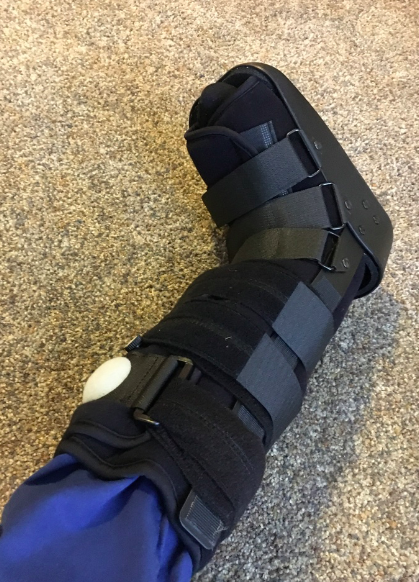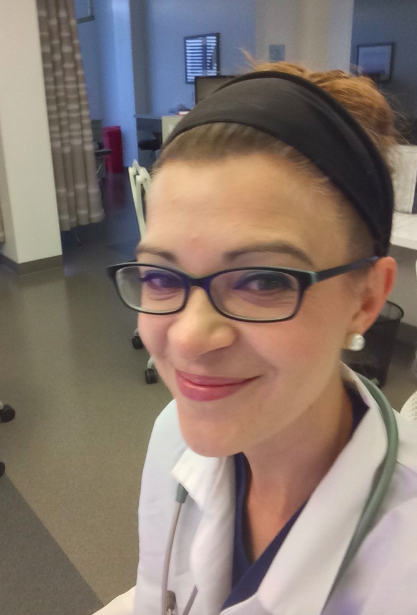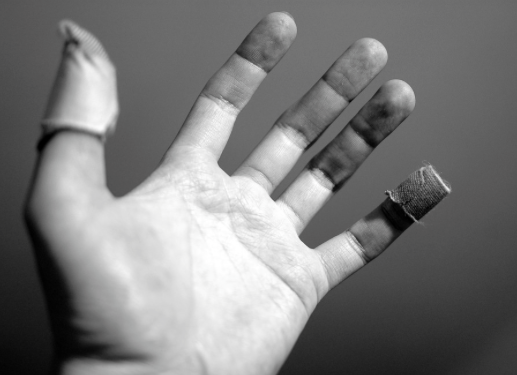me, too: how pain connects us to each other
I broke my ankle a few weeks ago, when my shoe got caught in a moving sidewalk at an airport on my way to a speaking engagement. In spite of the bruising and swelling, I spoke four times in two days, flew back to San Francisco, and went back to working in the urgent care where I practice medicine part time. In spite of the fracture, I haven't missed a second of work. We have a digital X-ray machine onsite, so on my first day back to work, in between patients, I took off my shoe and asked the X-ray tech to shoot a few images. While the images were processing, I went and saw the next patient. Then I came back to read the images -- and sure enough, my fibula (the outer ankle bone) was fractured.
I went to our ortho supply closet and retrieved a walking boot (that makes me look like an astronaut about to walk on the moon) and went to see the next patient.
And I kept working -- though, especially during 12-hour clinic shifts, it hurt. A lot. Over the next two weeks, I went through two bottles of Ibuprofen. I lived for the moment when I could come home, take off the boot, change out of scrubs, and lay with my foot propped up on a stack of pillows, wrapped up in a large bag of ice.

Because my boot is so big, most patients notice that I'm injured, and many of them ask me about how it happened, and how long my recovery is supposed to take. Especially my patients who come in for an ortho injury -- because they sprained their wrist or bruised their shoulder or fractured their foot -- start telling me about how much pain they're in and then they just gesture to my ankle and say, "Well -- I mean -- you know."
And I nod with an empathy I'd rather not know. I acknowledge the mutual pain I'd rather not feel (or have my patients feel). And at the end of the visit, when I say, "Feel better soon!" most of them reply "You, too!"
Because of my obvious injury, I've bonded with my patients in a unique and unusual way.

That's the thing about pain. None of us wants it. None of us would choose it. None of us would prefer pain's presence over its absence.
And yet.
The uniquely redemptive thing about pain is that it gives us empathy we couldn't have any other way.
One of the beautiful things about the Incarnation -- about Jesus, Emmanuel, God With Us -- is that Divine Love didn't just have sympathy for us. Jesus actually came to live as one of us.
The Message translation of Hebrews 4 says, "We don’t have a priest who is out of touch with our reality. He’s been through weakness and testing...So let’s walk right up to him and get what he is so ready to give. Take the mercy, accept the help."
When we come to Jesus with broken spirits, massive disappointments, wounded hearts, unfaithful friends, political oppression, physical hunger, blinding pain, spiritual abuse, financial poverty and weary souls, Divine Love doesn't look "down" on us with pity. Divine Love sits with us in hard-fought empathy and says, "Me, too."
Empathy is a gift like no other. It's a gift Love gives to us every moment of every day. It's a gift that meets us in each struggle and says, "Trust me, I know. I've been there, too. You can do this."

And empathy is a gift we can each give to each other. We can watch whatever pain we've been through be redeemed -- transformed as a gift we can give to others who are walking in the Valley of Shadows where we've been. Instead of looking down on people who are struggling, we can walk with them on that path and say, "Trust me, I know. I've been there, too. You can do this."
Like my boot has helped me connect with my patients, we can use the hard things in our lives as connecting points with each other.
We can meet people with an embrace and say, "Me, too."